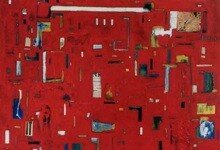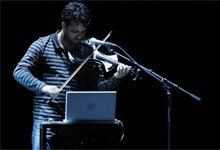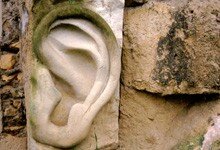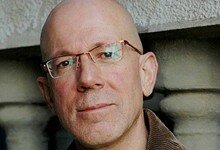Speaking in tongues
Can one write? How to achieve utter simplicity? Would it not be better to remain silent if one is unable to write the perfect work? Benjamin Shvili asks Beckett-like questions of himself and us.
“O you are beautiful, my writing, o you are beautiful, your letters are doves under the clouds, come back, my writing, come back and I will hold you,” writes Benjamin Shvili in his novel The Milky Way. The book is not strictly speaking a novel, rather a fragmented journey made by a Jewish mystic in search of inspiration for his writing, a harrowing description of highs and lows. Shvili’s paraphrase of The Song of Songs can be read as the key to the code of the entire book: by identifying with poets greater than himself, the writer expresses both his narcissistic love for his own writing and his despair at his inability to write as well as they do.
Self-love and despair are both depicted with dizzying honesty in the book. Rarely is an author so open about his writing process. Many authors will recognise the megalomaniac pleasure of a writing breakthrough and the misery of writing’s other partner, self-doubt. The writer’s true fantasy almost always remains hidden and readers have to make do with what remains once the storm of writing is over.
The ups and downs of wandering in the footsteps of [medieval Hebrew poets] Yehudah Halevi, Ibn Gabirol and others are essential dictates of his search for inspiration. This is a kind of mania, because the inspiration he seeks is no less than divine, a mystical sense of connection with all words written before, the transparent use of words, of ultimate writing. And it is depression, too, because in the search for inspiration we must also recognise the fact that inspiration is never in the writer’s control, but rather controls him.
The sense of greatness is reflected, for example, in an imaginary conversation in which Ibn Gabirol tells a time-travelling poet: “I would never have written ‘Royal Crown’ if I were alive today, but I might perhaps have written what you would write.” The despair which inevitably follows mania is expressed in Shvili’s self-criticism, just before the end of his journey: “There is no emotion, no love, no real search, no God, and worst of all no story at all in your writing. You are trapped in a dark cave with no way out.”
The writer’s ups and downs are so extreme that the language of the text sometimes becomes itself truly schizophrenic, driven not by story but by sound, with an inner logic which appears to be devoid of logic. It is a language which moves forward in wild, associative leaps, almost impossible to follow: “In the beginning God created letters. Not photography, not painting, not sculpture. Writing. Then he created my Mom halfway and back, from Mom he created truth which is beginning, middle and end . . . . and Dad, Dad and Mom together are love, because Dad is in the word love. Solomon Ibn Gabirol asked me to write all this in the café at a quarter of four, in thirty seven degrees, at Sargossi’s by the pillar”. But whenever it seems that his train of thought has completely gone off the rails, the writer gets back on track in the nick of time and explains to us that “before leaving me to another painful night, [Ibn Gabirol] asked me to write simply, to write airplane instead of eagle, train instead of snake, bus instead of iron horse because that is what it is”. In other words, Shvili pulls himself together, and gives us a key with which to understand his writing and him.
Because Shvili wants to be understood. Wants to and doesn’t want to. He builds a secret language, but just before the reader gives up and moves on, he takes it back, gives in and chooses to speak clearly. Perhaps because the other side of his objection to being understood is a desire to be interpreted. So there is something ironic, perhaps even tragic, in the fact that his deliberate opacity is sometimes off-putting. At the same time, one senses that Shvili is conducting an authentic inner struggle between a desire to speak and his attraction to silence. If in the end the desire to be understood is the victor, it is at least in part because, according to Shvili, this desire, acknowledging the “other”, is what distinguishes the writer from the madman. A healthy person acknowledges the other: the reader exists in the writer’s mind and the writer exists in the reader’s mind. The madman, on the other hand, conducts a dialogue in which he himself takes up both positions: both speaker and listener, writer and reader.
The desire to speak in tongues without paying the lonely price of incomprehensibility is forcibly expressed in Shvili’s description of an encounter with a truly mad poet. In beautifully straightforward prose, of a kind rarely written by Shvili, he describes how a sick poet tries to sell him poems dedicated to Sylvia Plath: “I asked how much she wanted for them and she said it wouldn’t be cheap and asked for fifty euros, and when I said no she took it well and asked for a cigarette, I gave her a cigarette, she lit it and sang ‘be a friend to me, be a brother to me’. I got up, said goodbye and went to the Santa Katerina monastery [in the Sinai Desert]. Three hours later I was sitting next to a young Portuguese woman who was reading a book and I thought to myself: the balanced person reads rather than writes. At dusk, as the Sabbath approached, I walked the streets of the letter P and looked at the poverty which expressed its beauty.” Thus, in allowing his exposure to touch insanity and then to turn away from it, letting his narcissism seduce the reader and then repel him, Shvili is imitating the great poets and trying to find an answer to the questions which trouble only a writer who sees the possibility of divinity as a basic condition. Can one write? How to achieve utter simplicity? Would it not be better to remain silent if one is unable to write the perfect work? Is reading not also a kind of writing for the person writing? And life itself – may that be considered writing; transparent, perfect writing which is not limited by words, writing without words, which are arrested at the limit of letters? Can one write from within a sense of home and satisfaction or only from a position of wandering and longing? Is not the conscious attempt to write the truth fundamentally a lie? Shvili has a single, triumphant answer to all these questions: that writing, anyway and from the start, will always lose to not-writing, and that the best book is always that which you have not written.
Amalia Rosenblum is the author of two novels and co-author of a non-fiction work on Israeli culture and language.










